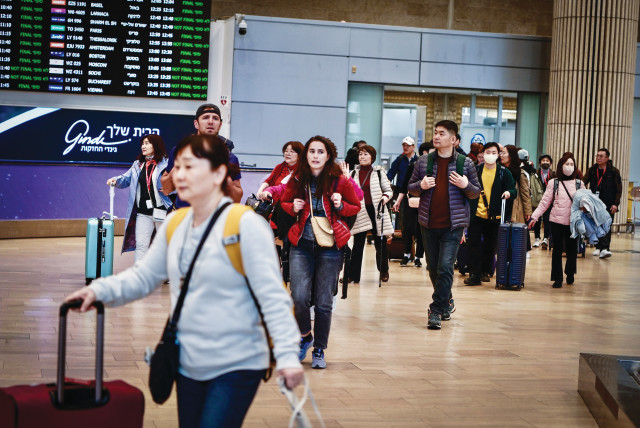Insights on Israel’s future tourism recovery

Tourism has not yet rebounded, and its absence is hurting the entire industry, causing despair, side by side with collapsing businesses.
Walking inside the spacious lobby of the David InterContinental hotel Tel Aviv reminded me of my visit there during the COVID-19 pandemic. Guests are hardly seen, reception is manned by one attendant, the luxurious Concierge lounge is dark and its doors are locked. But this atmosphere is misleading. A spark of optimism is alive and kicking.
General Manager Franco Vella waits for me with a big confident smile and together we walk to the enormous convention floor for the only event taking place, under his patronage. Heads of the Tourism and hotels division of the Kinneret Academic College conducted a mini-convention with 200 participants to analyze how the recovery of Israel tourism will look. “In times of crisis seek the Professor’s compass,” I thought to myself and joined the audience, to learn more about what might ignite Israel’s tourism groove.
“History teaches that after wars and periods of crisis in Israel, we will always see a growth and return of demand,” says Alon Galbman, a professor and head of the International Master’s Program. ”Currently we witness sparks in domestic tourism. It starts with more family and community tourism, sometimes with a cultural experience added value. Guests of hotels or short-term rentals have to deal with the psychological barrier of ‘how can I even think of going on vacation on days like this?’ More significant is how incoming tourism will return. We anticipate two phases: Israel’s hard market segments will be first. That includes businessmen, VFR tourism (visit friends & relatives), solidarity groups and volunteer tourism. The brand of the Holy Land, which attracts many pilgrims and evangelists, will play a significant role. The second pulse, the normal leisure tourism will also return, but that will likely take longer, and, of course, the speed of return depends on the materialization of the first pulse. This first phase is crucial as it will function as a signal to others that it is time to return to Israel”, he says.
“Family visits are expected soon and they will create a significant momentum, to be followed by Jewish community groups from the US. Growing antisemitism will ignite visits like Taglit-Birthright Israel, the free 10-day heritage trip to Israel. US Evangelical Christians visits are expected as well, says Eran Ketter, who holds a doctorate and is head of the Department of Tourism and Hospitality Management. “If we refer to the Protective Edge Gaza operation in 2014 as a case study we will discover that recovery started significantly with visits from North America. This will definitely repeat itself. Currently, Israeli propaganda is understandably pushing messages focusing on Hamas's horrors and atrocities. Travel campaigns to visit Israel taking place simultaneously are impossible,” he says.
Tourism has not yet rebounded, and its absence is hurting the entire industry, causing despair, side by side with collapsing businesses. The furlough mechanism is partly helping to assist the hospitality workforce. Faith-based travelers are key for recovery. The Gaza war may now seem catastrophic for inbound tourism.
These troubles have also been felt by other countries
HOWEVER, NUMEROUS countries suffered cataclysmic troubles in the last decade. Egypt has suffered crises due to the Arab Spring uprisings, terrorist attacks, and internal political tensions. The note-worthy performance of the tourism sector there is no coincidence, but rather the result of a strategic approach by the government and private stakeholders, recognizing the importance and potential of the tourism industry for the national economy. The results are impressive. According to Egypt’s Minister of Tourism, a record-breaking 14.9 million tourists visited Egypt in 2023, marking a 33 percent growth in the country’s share of global tourism compared to 2019.
Tourism following Japan’s nuclear Fukushima disaster in 2011 recovered 4 years later. In 2015, the number of tourists visiting was higher than before the crisis. Japan’s authorities launched campaigns and sent out messages that the country is a safe travel destination, except for specific minor designated areas. The Kyoto district, the most popular travel destination, with famous buildings declared a World Heritage Site, paid tour operators during the travel crisis €800 for each group of 20 tourists. Shigemitsu Tada, leader of the regional tourism authority, said that this successful campaign alone cost €150,000.
Thailand’s tourism has bounced back from several crisis events since 2000. These include natural disasters such as the Indian Ocean tsunami of 2004 and extensive floods in 2011, episodes of political instability, terrorism, and the perceptual SARS scare of 2003. “Beyond the restoration of the infrastructure and buildings following the tsunami disaster, the Thai government was required to restart the tourist activity, return the flight routes and above all to re-convince the tourists that the danger has passed”, says Galbman. “One of the strategies adopted and funded by the Thai government, was a campaign aiming target audiences such as the Australian market, offering holiday packages at extremely low subsidized prices. Captivating these tourists to book vacations in Phuket island was crucial. Attracting tourists of a more adventurous nature was key, as a motivating positive factor. After they testified that the island is safe, infrastructures restored and hotels were renovated, leading to an enjoyable vacation at a low cost, tourism started to flourish,” he says.
Egypt, Japan, and Thailand recovery indicates that there is constantly a light at the end of the tunnel. Visionary thinking brings encouraging indicators, even for outbound tourism. When CEO at Israir airlines Uri Sirkis revealed in his presentation that he is focused during the Gaza war on planning a route from Ben-Gurion Airport to Mecca in Saudi Arabia, I was truly impressed, he is a person that truly thinks outside the box in times of crisis. “I declare that I do not take anti-hallucinations pills’, he announced while speaking and the astonished participants laughed.
During the coffee break before my departure I was informed of another encouraging “sweetener” for those planning a trip to Israel. The InterContinental Hotels Group (IHG) with more than 6000 hotels globally, nominated Eyal Goldberger, General Manager of the David Citadel Jerusalem Hotel, as boss of the new InterContinental Jerusalem. Scheduled to open early 2025, this luxury property with 237 rooms and 34 suites is located on King George Street, across from the great synagogue. “This hotel is set to redefine hospitality in the capital city. The countdown is on, and I can hardly contain my excitement for this unparalleled addition to Jerusalem’s hospitality scene,” says Goldberger.
Israel’s importance as a prime travel destination is a beacon of light that the hospitality industry and the global brands are confident about.
The writer is the Travel Flash Tips publisher.
Jerusalem Post Store
`; document.getElementById("linkPremium").innerHTML = cont; var divWithLink = document.getElementById("premium-link"); if (divWithLink !== null && divWithLink !== 'undefined') { divWithLink.style.border = "solid 1px #cb0f3e"; divWithLink.style.textAlign = "center"; divWithLink.style.marginBottom = "15px"; divWithLink.style.marginTop = "15px"; divWithLink.style.width = "100%"; divWithLink.style.backgroundColor = "#122952"; divWithLink.style.color = "#ffffff"; divWithLink.style.lineHeight = "1.5"; } } (function (v, i) { });

